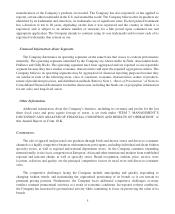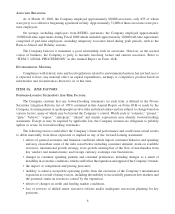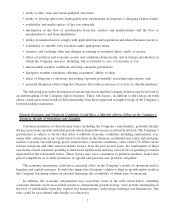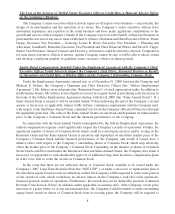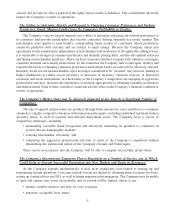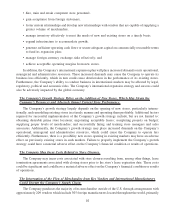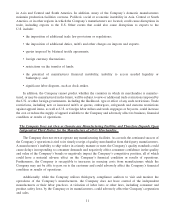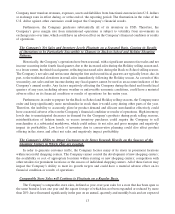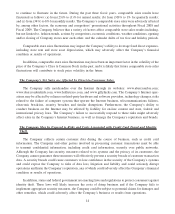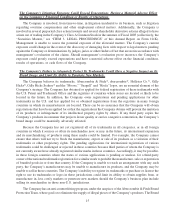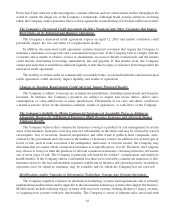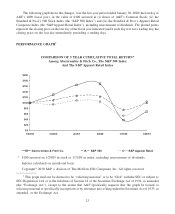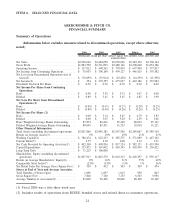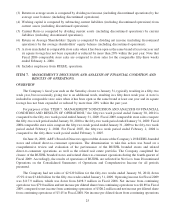Abercrombie & Fitch 2009 Annual Report Download - page 16
Download and view the complete annual report
Please find page 16 of the 2009 Abercrombie & Fitch annual report below. You can navigate through the pages in the report by either clicking on the pages listed below, or by using the keyword search tool below to find specific information within the annual report.
The Company’s Litigation Exposure Could Exceed Expectations, Having a Material Adverse Effect
on the Company’s Financial Condition or Results of Operations.
The Company is involved, from time-to-time, in litigation incidental to its business, such as litigation
regarding overtime compensation and other employment related matters. Additionally, the Company is
involved in several purported class action lawsuits and several shareholder derivative actions alleged to have
arisen out of trading in the Company’s Class A Common Stock in the summer of Fiscal 2005 (collectively, the
“Securities Matters,” see “ITEM 3. LEGAL PROCEEDINGS” of this Annual Report on Form 10-K).
Management is unable to assess the potential exposure of the aforesaid matters. The Company’s current
exposure could change in the event of the discovery of damaging facts with respect to legal matters pending
against the Company or determinations by judges, juries or other finders of fact that are not in accordance with
management’s evaluation of the claims. Should management’s evaluation prove incorrect, the Company’s
exposure could greatly exceed expectations and have a material adverse effect on the financial condition,
results of operations, or cash flows of the Company.
The Company’s Failure to Adequately Protect Its Trademarks Could Have a Negative Impact on Its
Brand Image and Limit Its Ability to Penetrate New Markets.
The Company believes its trademarks, Abercrombie & Fitch», abercrombie», Hollister Co.», Gilly
Hicks», Gilly Hicks Sydney»and the “Moose,” “Seagull” and “Koala” logos, are an essential element of the
Company’s strategy. The Company has obtained or applied for federal registration of these trademarks with
the U.S. Patent and Trademark Office and the registries of countries where stores are located or likely to be
located in the future. In addition, the Company owns registrations and pending applications for other
trademarks in the U.S. and has applied for or obtained registrations from the registries in many foreign
countries in which its manufacturers are located. There can be no assurance that the Company will obtain
registrations that have been applied for or that the registrations the Company obtains will prevent the imitation
of its products or infringement of its intellectual property rights by others. If any third party copies the
Company’s products in a manner that projects lesser quality or carries a negative connotation, the Company’s
brand image could be materially adversely affected.
Because the Company has not yet registered all of its trademarks in all categories, or in all foreign
countries in which it sources or offers its merchandise now, or may in the future, its international expansion
and its merchandising of products using these marks could be limited. For example, the Company cannot
ensure that others will not try to block the manufacture, export or sale of its products as a violation of their
trademarks or other proprietary rights. The pending applications for international registration of various
trademarks could be challenged or rejected in those countries because third parties of whom the Company is
not currently aware have already registered similar marks in those countries. Accordingly, it may be possible,
in those foreign countries where the status of various applications is pending or unclear, for a third-party
owner of the national trademark registration for a similar mark to prohibit the manufacture, sale or exportation
of branded goods in or from that country. If the Company is unable to reach an arrangement with any such
party, the Company’s manufacturers may be unable to manufacture its products, and the Company may be
unable to sell in those countries. The Company’s inability to register its trademarks or purchase or license the
right to use its trademarks or logos in these jurisdictions could limit its ability to obtain supplies from, or
manufacture in, less costly markets or penetrate new markets should the Company’s business plan include
selling its merchandise in those non-U.S. jurisdictions.
The Company has an anti-counterfeiting program, under the auspices of the Abercrombie & Fitch Brand
Protection Team, whose goal is to eliminate the supply of illegal pieces of the Company’s products. The Brand
15


